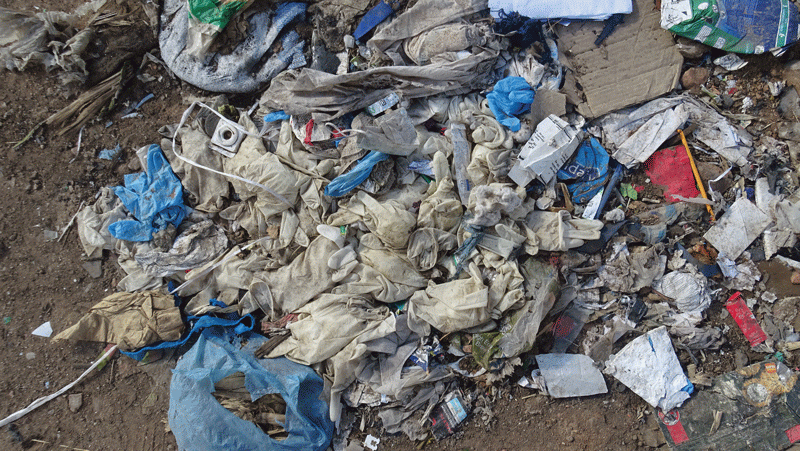
A serious public health threat is quietly festering at Bulawayo City Council’s Richmond dumpsite, popularly known as Ngozi Mine, where hazardous medical waste lies strewn carelessly across the ground.
Once designed to save lives within the sterile environments of clinics and hospitals, blood-stained cotton swabs, used HIV and Syphilis testing kits, surgical gloves, and contaminated protective clothing now rot in open air, posing a grave danger to residents and the environment.
Amidst the mounds of ordinary refuse, Southern Eye on Sunday uncovered shocking evidence of unregulated medical waste disposal at the Richmond landfill.
During a recent visit to the site, schoolchildren were seen rummaging through the debris oblivious to the deadly risks such exposure may carry.
Adults were also scavenging through the dump, searching for recyclable materials like plastic, metal, and electronics, despite the obvious health hazards.
“Yes, we are aware of the health risks posed by what we are doing,” said an elderly waste picker, who declined to be named.
“But what can we do when our families need to eat? I have been surviving through this waste since I came to Bulawayo in 1996.”
Despite repeated efforts by this publication to obtain an official response from the Bulawayo City Council regarding the dumping of medical waste at the site, no formal comment was provided.
- Byo author eyes SA award
- WB revises downwards Zim growth
- Letters: Zanu PF to blame for anything wrong in Zim
- Shortages show the poverty of ideas in govt
Keep Reading
Nearly a month after submitting inquiries, the council’s public relations department had yet to respond, despite acknowledging receipt and promising feedback.
The Environmental Management Agency (EMA), however, confirmed that the Richmond landfill is not authorised to receive medical waste.
Amkela Sidange, EMA’s Environmental Education and Publicity manager, said the presence of such waste points to illegal dumping.
“Local authorities must monitor waste disposal and account for every item disposed of at their sites for the safety of both people and the environment,” Sidange said.
EMA also emphasized that all medical waste must be incinerated to ensure public safety.
“We are not currently aware of any illegal disposal at the Richmond landfill, and previous inspections have not shown any medical waste.
“However, we conduct routine and adhoc inspections as part of our mandate,” she added.
EMA warned that any confirmed reports of hazardous waste dumping will lead to prosecution under the Environmental Management Act (CAP 20:27).
Sidange said the agency is also exploring public awareness campaigns in order to educate communities on the dangers of illegal dumping.
Zimbabwe’s waste disposal laws are unambiguous. Under the Cradle-to-Grave Principle, waste generators including hospitals and clinics are responsible for the safe handling of waste from its origin to its final disposal.
“Healthcare facilities must develop comprehensive waste management plans, maintain records, and use licensed disposal services,” she said.
Disposal should occur at authorized facilities using proper methods such as incineration or, where available, alternative sterilization techniques.
Ashwell Mberi, a representative of Innovative Healthcare Solutions, a local supplier of medical equipment and disposables, stressed the need for clearly labeled waste collection systems at health institutions.
“There should be distinct collection points one for medical waste, one for general waste, and another for paper waste,”Mberi said.
“Medical waste, especially must be collected in red bags and transported directly to designated incineration points away from the general public,” he explained.
He also emphasised that improper handling of medical waste can serve as a vector for infectious diseases.
“This type of waste often contains harmful substances and bacteria. If left unchecked, it becomes a breeding ground for hospital-related infections and can facilitate the spread of disease within communities,”Mberi warned.
The unfolding situation at Richmond is a stark reminder of the urgent need for improved waste governance and stronger accountability mechanisms.
While EMA pledged to investigate and prosecute offenders, the silence from the Bulawayo City Council raises troubling concerns about oversight and enforcement.
Ultimately, the safety of Bulawayo’s residents especially vulnerable children and waste pickers hangs in the balance. Without immediate action and tighter regulatory controls, the city could be on the brink of a public health disaster, with consequences that stretch far beyond the dumpsite’s perimeter.









